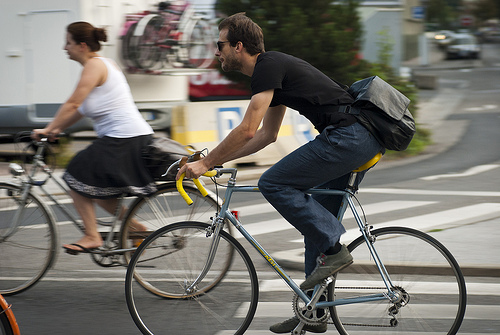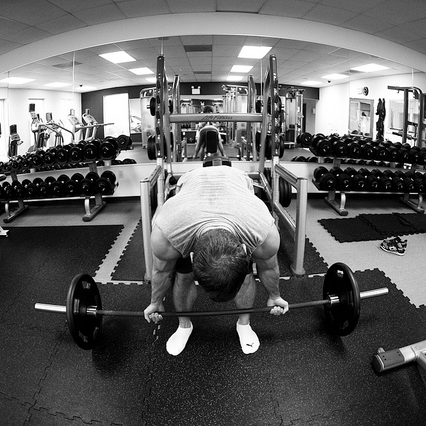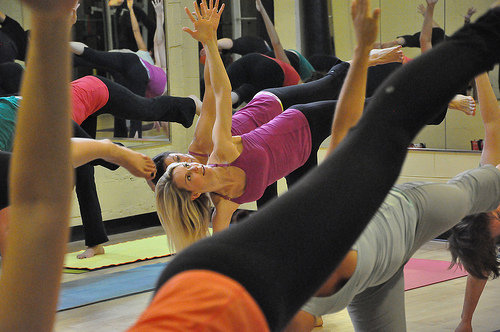Print Edition: January 25, 2012
New Years has come and gone, and with its passing comes another installment of two predictable resolutions that are needlessly doomed to failure. The first usually habilitates an incessant need to improve test marks: “I’m going to keep up with my reading this semester. Definitely. Without question! No more cramming for me.” For me at least, the attempt to wrestle study habits into obedience is as feeble as the feigned optimism made to mark its inevitable success. The second goal always involves health and fitness. This goal often gets buried behind a number of seemingly more important tasks, like studying for a final, or watching Grey’s Anatomy. Admittedly, there’s not much I can do to help you with the first resolution; you are reading the Sports section, after all (were you really expecting cliff notes on how to become the next Aristotle?). But don’t despair! You’ve come to the right place for the tools you need to start your health and fitness goals, whatever they may be. And, most importantly, what you need to know to see them through.
The first thing you need to do is find a fitness activity that best meets your goals, and is also fun. It’s hard to stick to any exercise regime if you don’t enjoy it. Too often when people think of exercise, they immediately think of running on a treadmill, stuck in the corner of some stuffy gym. There are loads of different ways to get active that will have you on the fast track to success. It really just depends on what your goals are.
Goal 1: Losing Weight
If your goal is to lose the 10 pounds that’s been sitting around your waist like a spare tire, you’re in luck. There are loads of different ways to shed it. Furthermore, the ways to achieve this goal are oftentimes the cheapest and easiest ways to start exercising; sometimes it’s as easy as strapping on a pair of running shoes and heading out the front door. Generally, you’ll want to look for activities that have mid-to-low intensity levels, and last for longer durations of time: at least 30 minutes, according to Gill Fedechko, a kinesiologist from Golden Ears Physiotherapy. Here are some examples:
• Long-distance running: The benefits of running can’t be overstated; Fedechko affirmed that running allows for weight loss, improved fitness, and increased leg and core strength. The best part is that you can walk out your front door, pick a direction, and start running. It’s that easy. The only cost is a pair of running shoes. And maybe some spandex shorts – because chaffing is no laughing matter. If the great outdoors aren’t for you, treadmills and elliptical machines are a great option, although a more expensive one. If you don’t have one at home, using one at a gym can cost up to seven dollars every visit, or up to $45 a month. A much cheaper option is using the UFV gym, which costs $25 a term, or $35 a year, making it the bargain of the semester. The only upside to using other gyms is that UFV’s treadmills don’t have TVs built into them (yet).
• Cycling: Similar to running, cycling allows for the development of a strong cardiovascular base, and will help you to effectively burn through fat, according to Fedechko. Again, it serves as a cheap, hassle-free way to exercise: just get on your bike and go. Of course, a hardcore road bike can set you back thousands, but it’s really not required. Any bike with a decent number of gears should do. Alternatively, most gyms have stationary bikes, and many hold free spin classes, which are group workouts led by an instructor. They usually last for 45-60 minutes and have a pretty relaxed atmosphere. However, Fedechko warned that spin classes are higher intensity workouts, and will work more on your aerobic capacity than burning fat.
• Swimming: If you’re worried about previous injuries coming back to haunt you, then swimming may be for you. Swimming is an extremely low-impact sport that can really help you shed the weight. It’s an all-body workout that also improves your cardiovascular fitness, according to Fedechko. Plus, it’s not all that complicated to do, so it should be easy to pick up. It will dip into your wallet more than running or cycling, however. A single session will cost around $7, and a year pass costs around $500 (the centre in Abbotsford is by far the cheapest in the region at $464 for a year pass). This means that you would have to swim at least twice a week in order to make the year pass worth the expense.
• Cross-country skiing: I’m not going to lie to you, it’s not easy. It requires a good deal of coordination, and if you get frustrated easily, this may not be for you. That said, cross-country skiing remains an extremely underrated and rewarding winter activity, once you get the hang of it. It’s an activity that works your whole body and benefits your cardiovascular system, explained Fedechko. It’s also relatively affordable compared to other winter sports. A day trail pass normally costs $20 at Cypress (compared to $60 for downhill). Buying skis can get very expensive, but the Tradex in Abbotsford does host the Winter Extreme Ski Show & Swap every fall, allowing you to buy used skis for unbelievable bargains (visit winterextreme.com for more information). If this really doesn’t sound like your cup of tea, snowshoeing is another way to get active in the snow, and leads to great views and even greater workouts. A day pass and rental cost just $26 at Cypress.
Goal 2: Getting Ripped
On the other end of the spectrum is the group of people who want to have the biceps of a bronzed god (or goddess). Unfortunately the direct options become more limited. Generally, you should look for exercises that have high intensity and last for short periods of time, such as sprinting, or weightlifting. If this is your goal, you’re likely going to spend a lot of time in weight rooms. The good news is that there are a plethora of exercises that can be done in a gym, so it’s easy to make fun and variable workouts with enough imagination. Again, the costs involved will only make yearly passes worth it if you plan on going to a normal gym twice a week or more, but the UFV gym gives you access for only $35 a year. If that sounds too expensive for you, there are many traditional exercises that you can do at home, such as core exercises and pushups. You’d be amazed at how many variations there are of these exercises, and each variation works slightly different muscles. Just do a Google search for ideas.
Goal 3: Getting Fit
If you don’t have a specific goal, but want to get fit all the same, the possibilities are almost endless. Progress here won’t be as dramatic as the specific goals listed above, but it will be better-rounded, as you’ll experience both weight-loss and toning. Typically, this applies to most team sports. For ease of access, UFV also offers a number of excessively reasonably-priced activities for you to get involved in. The north gym features a drop-in program that lets you use any sporting equipment available at no cost. There’s also a number of fitness classes, such as a Beginner Fitness Class, Zumba (a dance class), and Pilates (it’s like yoga, but more intensive). If that’s not enough, there are drop-in intramurals held as well. These are all included in the $15 per-semester or $20 per year pass that can be purchased in Building E. For a little bit more, you can also enter the Intramural League, which runs for eight weeks, and costs $15 per player.
You may also enjoy getting out into the wilderness. If that’s the case, be sure to get on the mailing list of the Student Outdoor Life and Recreation Outdoor Club (SOLAR), which organizes outdoor trips such as hiking or kayaking. They’ll notify you if any events are coming up. For more information on programs offered at UFV, visit ufv.ca.
By now, you should be getting a good idea of what you think will work for you. In coming issues, we’ll discuss how to stay exercising once you’ve started, and what sort of effects sleep and nutrition can have on your progress.





